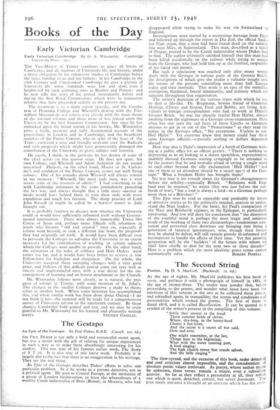The Gestapo
An Epic of the Gestapo. Sir Paul Dukes, K.B.E. (Cassell. los. 6d.) SIR PAUL DUKES is not only a bold and resourceful secret agent, but also a writer with the gift of relating his unique experiences in such a way as to make them absorbingly interesting for his readers. This was true of his famous earlier work, The Story of S T 25. It is also true of this latest work. Probably it is largely due to the fact that there is no exaggeration in his writings. They are the real thing.
An Epic of the Gestapo describes Dukes' efforts to solve one particular problem. In it he works as a private detective, not as a political agent. He goes to Central Europe, at the invitation of a group of London businessmen, to trace the whereabouts of a wealthy Czech industrialist of Brno (Briinn), in Moravia, who had
disappeared while trying to make his way via Switzerland to England.
Investigations were started by a mysterious message from Paris and followed up through the report in Die Zeit, the official Sude- ten Nazi organ, that a man had been found dead on the railway line near Mies, in Sudetenland. This man, described as a tailor of Prague, proved to be the Czech industrialist whom Dukes had to find. The author ultimately satisfied himself that this man had been killed accidentally on the railway while trying to escape from the Gestapo, who had held him up at the frontier, suspicious of his faked exit permit.
But such a conclusion was reached only after many wordy duels with the Gestapo in various parts of the Greater Reich, the descriptions of which give the reader a valuable insight into the nature of the persons controlling more than half Europe today and their methods. This work is an epic of the veniality, corruption, blackmail, brutal inhumanity, and jealousy which are rampant throughout that organisation.
The writer's depiction of the various types with which he has to deal is life-like. Dr. Bergmann, bosom friend of Gauleiter Henlein, Cherry and Stepan, Fred and Bobby, are living indi- viduals to foreign correspondents who had to work in Hitler's Greater Reich. So was the abjectly fearful Herr Haller, always awaking from the nightmare of a Gestapo cross-examination. How often has one seen the sad faces of those Czechs or Germans anxious to get in or out of the " Protectorate " as they read the notice in the Gestapo office, " No exceptions. Useless to ask. Heil Hitler." Yet everyone knew that money could buy these same Gestapo officials—especially sterling or dollars deposited abroad!
How true also is Duke's impression of a batch of Germans wait- ing at a public office for an official permit : " There is nothing so depressing as to sit looking at a dozen speechless, expressionless, shabbily dressed Germans waiting cringingly to be attended to by the powers that be and mortally afraid of saying a single word to each other beyond the silly exclamation ' Heil Hitler! ' lest one of them or an attendant should be a secret age .tof the Ges- tapo." What a freedom Hitler has brought them!
No less true is his remark about the German's obsequiousness before the nobility—especially British. "Relations with Eng- land may be strained," he writes (this was just before the out- break of war), " but a lord is always a lord—to a German perhaps more than to a Britisher! "
This Epic may be read as enjoyably and profitably by lovers of detective stories as by the politically minded, anxious to under- stand the Nazi leaders. For the latter, Sir Paul's comparison of the Nazi and Bolshevik regimes, in the Epilogue, is particularly interesting. And few will deny his conclusion that " the distortion of the youthful mind is perhaps the most tragic and ominous result of the working of these two dictatorships—tendentious edu- cation and perverted class doctrines are bringing into being a generation of fanatical ignoramuses, who, though their frenzy may be abated by defeat, will still remain grossly ill-informed and incompetent to handle the affairs of their time. Yet this growing generation will be the ' builders ' of the future with whom we shall have chiefly to deal for the next two or three decades." Here is a problem which the most idealistic peace terms cannot






























 Previous page
Previous page